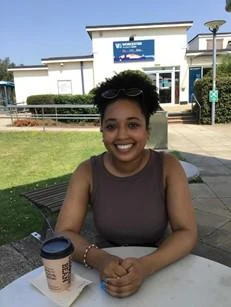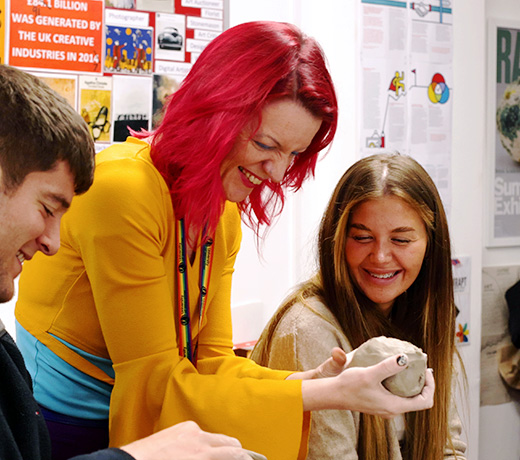We have an excellent reputation with schools in the region and have been training highly skilled, inspirational primary school teachers for over 75 years. This course will equip you to make a real difference in children’s lives through varied school placements, interactive subject sessions, and tailored tutor support.
Joint 1st in the UK for Quality Education
An exciting and inspiring place for trainee primary teachers to study
We’ve been rated as ‘Outstanding’ in training primary and secondary teachers, the highest possible grade a provider can receive.
University of the Year finalist
Recognised for our graduate success, we’re shortlisted for University of the Year in the Times Higher Education Awards 2025.
Overview
Later Years (ages 5 to 11) – you’ll cover the National Curriculum for Key Stage 1 and 2, with school experience taking place in KS1 and KS2 settings. You’ll gain experience through multiple placements in a variety of school environments throughout the year, preparing you for a successful transition into teaching. This pathway offers an extended placement opportunity in a special educational provision setting - such as a special school, Alternative Provision or a specially resourced unit attached to a mainstream school - in addition to your mainstream school placements.
Our PGCE Primary with Special Educational Needs, Disability and Inclusion (SENDI) is for those aspiring to become a skilled primary teacher with particular expertise in teaching children with SEND and learning differences.
In addition to your interactive subject sessions, you’ll take part in bespoke taught SENDI sessions while on campus. These sessions will help you begin to specialise in person-centred, needs-driven teaching and learning to best meet the needs of pupils with SEND.
Our Ofsted Outstanding course offers you the opportunity to gain a postgraduate qualification alongside Qualified Teacher Status (QTS). With 60 credits at Masters level, our PGCE Primary with SENDI can open doors to further study and other employment opportunities.
When not on placement, you’ll be taught through a mixture of lectures, workshops and interactive subject sessions covering the full spectrum of National Curriculum subjects. In these interactive sessions, our tutors will model effective teaching and classroom management strategies. Specialist facilities, such as our DT rooms, gymnasium, dance studio, music room and art studio, are designed to replicate the school environments you’ll be teaching in, allowing you to learn in authentic settings.
There are no exams on this course. Instead, you’ll be assessed through two written assignments and a digital portfolio that you’ll complete during your school experience placements. This portfolio contains several tasks linked to the Department for Education’s Teachers’ Standards, which you must meet to qualify as a teacher.
Placements
School placements are a key element of the course. Two of your placements will be completed in mainstream schools, while one placement will take place in a special educational provision setting - such as a special school, Alternative Provision or a specially resourced unit attached to a mainstream school. This will allow you to develop your knowledge, skills and understanding of SENDI best practice.
We work hard to maintain strong relationships with over 260 schools across 25 local authorities and will organise placements for you in supportive environments. While on placement you’ll be supported by your class teacher and lead mentor, in addition to your university tutors. They will regularly observe you teach and give live feedback, so you can continually reflect on and improve your classroom practice.
Regional Training Hubs
You can apply to study a PGCE directly with the University or with one of our partner Regional Training Hubs.
These Regional Training Hubs are networks of schools working together to train teachers. When you apply through a hub you will do a mix of training at their sites and at the University, and the hub will organise your placements within their network of schools.
Upcoming events
Course content
You’ll study modules covering the whole primary curriculum to build your subject knowledge and teaching skills, and cover topics like behaviour management and inclusive practice.
All modules are mandatory to ensure you’re eligible for Qualified Teacher Status.
This course is informed by the latest research and feedback from students, staff, and placement schools. Modules do sometimes change to reflect this. The most up-to-date module information will be available to you once you have accepted a place and registered on the course.
Careers
This course will qualify you to teach in primary schools in England and Wales. Most of our students quickly find jobs after graduation, thanks to the confidence they’ve gained on the course, the connections they make on placement and our excellent reputation with schools in the region. Our SENDI pathway will provide you with a strong foundation to specialise further in SENDI, as an ECT and beyond.
Many of our graduates pursue leadership roles within schools, as Special Educational Needs and Disabilities Coordinators (SENDCos), key stage leaders, deputies, or head teachers.
The PGCE is an internationally recognised teaching qualification and can widen your opportunities for a career overseas. You’ll be able to seek work in countries such as America, Australia, and Canada.
The 60 credits you gain at Masters level mean our course is also an ideal springboard for those seeking further postgraduate study. These credits can be put towards a full Masters qualification, such as our multiple pathway Education MA.
Support early in your career
At Worcester, the support doesn’t end when you graduate. Our Early Career Teacher (ECT) network continues to offer support and professional development opportunities as you go into your first job.
Graduate case studies
A few recent graduates reflect on their time on the course.
Course highlights
Teaching and assessment
You'll be taught through a combination of interactive seminars, workshops, and lectures. In the seminars, you’ll link educational theory to your placement experience, through reflection and evaluation.
You’ll have seminars in all National Curriculum subjects, allowing you to experience the full range of primary subjects while developing a specialism in SEND through nine bespoke sessions. A typical session will be interactive, with practical work, group discussions and the chance to ask questions. Practical subjects will be taught in specialist spaces such as gymnasiums, dance studios and DT rooms.
There are no exams on this course. Instead, you’ll be assessed through two written assignments and a digital portfolio that you’ll complete during your school experience placements. This portfolio contains several tasks linked to the Department for Education’s Teachers’ Standards, which you must meet to qualify as a teacher.
Teaching and assessment contents
The PGCE course enables all trainees to become autonomous learners. The course is designed to support trainees of varying experiences, needs and background; to develop key/transferable skills and to disseminate good practice in learning and teaching. To achieve this we closely monitor the quality of your experience in university and on placement.
You are taught through a combination of:
- School experience in a range of settings
- Studying all areas of learning and teaching across all EYFS and Primary National Curriculum subjects
- Tutor-led workshops, lectures, seminars and guest lectures, primarily to introduce underpinning knowledge, theoretical argument, practical skills, central issues, key texts and inter-professional fields of study
- Participation in high level professional discussion, peer presentations and debate, to encourage you to actively engage with and critically challenge the field
- Directed studies and problem-solving tasks provide opportunities to develop approaches that will deepen levels of understanding and professional judgement; development of practice-based competence and skills of critical reflection through guided individual mentoring during placements
- One-to-one academic and personal tutorial support including access to our first class Firstpoint services
In addition, there are regular opportunities throughout the year to meet with your personal tutor, where you'll have the opportunity to talk about your academic progress, school experience, support with careers and applications.
Intensive Training and Practice (ITaP) are integrated within the course programme. ITaP allow you to explore granular aspects of the core content framework and focus on key skills that you'll need to be effective teachers. You'll be taught about the ITaP focus area, explore what this looks like in practice, engage in deliberate practice at university, before exploring the concept in school and engaging in deliberate practice within the school environment.
Meet the PGCE Primary team
You'll be taught by a teaching team whose expertise and knowledge are closely matched to the content of the modules on the course.
You can learn more about the staff by visiting our staff profiles.
Entry requirements
Honours degree normally (2:2) or higher from a United Kingdom higher education institution or equivalent qualification in Physical Education or a closely related area. Applicants with a 3rd class or non-Honours degree will be considered on an individual basis.
GCSE grade C/4 in English Language or English Literature, Mathematics and Science, or equivalent qualifications. We do offer an equivalency test if you don’t have the required GCSE grade to apply for our courses.
Trainees who begin courses before providing evidence of the required GCSE standard (or equivalent) will not be eligible for financial incentives, such as bursaries or grants until they achieve the required standard.
Any questions?
If you have any questions about entry requirements, please call our Admissions Office on 01905 855111 or email admissions@worc.ac.uk.
Fees
Fees contents
UK students
The standard tuition fee for full time UK students enrolling on a PGCE in the academic year 2026/27 is £9,790 per year (subject to changes in the government tuition fee cap).
Tuition fees are reviewed annually and may increase each year for both new and continuing students.
For more details on course fees, please visit our course fees page.
International and EU students
The standard tuition fee for full time international and EU students enrolling on a PGCE in the academic year 2026/27 is £18,400 per year.
*Please note that for EU students who are not in receipt of a UK government bursary/scholarship package, the fee is £9,790 per year (subject to changes in the government tuition fee cap).
For more details on course fees, please visit our course fees page.
"Trainees benefit from an exceptional learning experience at the University of Worcester. This experience instils in them a deep-rooted commitment to making a difference to the lives of the children and young adults in the communities they serve."
How to apply
How to apply contents
Applications for PGCE courses, both Primary and Secondary, should be made online through the government's Find Postgraduate Teacher Training website.
Visit the Get Into Teaching website for detailed information on how to apply for a PGCE.
Start your application
Apply for PGCE Primary with SENDI (5-11 years) - B197Other PGCE Primary programmes
- PGCE Primary (3-7 years) - X124
- PGCE Primary (5-11 years) - X104
- PGCE Primary with PE - 3DP6
You can also apply to study a University of Worcester PGCE with one of our partner Regional Hubs.
Contact
If you have any questions, please get in touch. We're here to help you every step of the way.

PGCE Primary Office
primarypgce@worc.ac.ukAdmissions Office
admissions@worc.ac.uk01905 855111More to explore
Open Days
Visiting us is the best way to get a feel for student life at the University of Worcester.

The City of Worcester
Worcester is a welcoming university city with great transport links and plenty of student parking.

Accommodation
Benefit from our accommodation guarantee. We have rooms on campus to suit every budget including en-suite options.

















